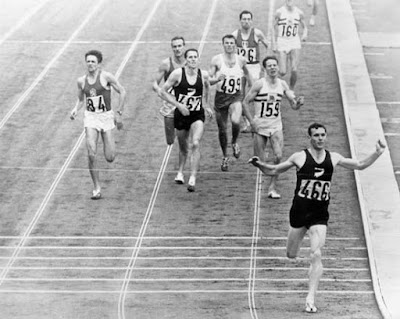Sport (or at least sports journalism) has become dominated by science. Every issue of Runners World that you pick up is primarily filled with tid-bits explaining how the latest study has proven this and demonstrated that. By the end of the magazine you're swigging down beetroot juice, disappearing off to the garden for tabata intervals every other hour and enjoying a big bowl of quinoa (or this month's wonder grain).
There's also an odd obsession with food with half of most running magazines dedicated to recipes for your next meal. I'm not sure when running and food became inextricably linked in the mind of the running editor but I guess it's an easy page filler. But I digress...
My issue with the overwhelming abundance of scientific literature from exercise physiologists is that it seems unescapably short-term. When you need to control all of the conditions surrounding the study and introduce a small change to properly analyse the results you will rarely get a holistic view of what leads to overall improvement. Not least of which improvement in race times is rarely used as a marker in the studies (as it can be affected by so many other factors) - leading to the use of physiological paramaters.
(Yes - I'm aware this does not exactly support my point - but anytime I can bring Bradley Whitford and Matthew Perry speaking lines written by Sorkin into a blog I will do so...)
An increase in your VO2 max is fantastic but does it actually mean you will race faster? On the balance of probabilities - yes, it should do. Will it improve them by more than a corresponding improvement in the lactate threshold? That's a bit more uncertain. How about running economy? Running economy to me remains a bit of a catch-all - an improvement means that you can run at the same pace for a reduced requirement but I have seen articles stating its improved by doing strides, by running at race pace, by running more total miles...
Will science get to the point where it has a perfect model written out for endurance training? Maybe one day. Unfortunately the headlines are driven by recent studies, quick studies, looking at small changes. If more of the media talked about studies and reviews like this one which attempts to look as holistically as possible over a number of years then my view might be a bit different.
Will science get to the point where it has a perfect model written out for endurance training? Maybe one day. Unfortunately the headlines are driven by recent studies, quick studies, looking at small changes. If more of the media talked about studies and reviews like this one which attempts to look as holistically as possible over a number of years then my view might be a bit different.
New runners to the sport (and coaches - especially where their experience is primarily from EA coaching courses) can get obsessed with the science of how to optimise the work-outs to the nth degree. They want to do it perfectly, to maximise the gains, and in the process miss the wood for the trees. Convinced that they are training as hard as possible, doing the perfect work-outs, eating specially selected meals whilst missing the very fundamentals of improvement in the sport set out over 50 years ago when Arthur Lydiard had an 800m runner running 100 miles a week.
How did that experiment end? Well....
This isn't a new concept (the obsession with the little things) - as this passage from one of my favourite books - Once a Runner by John L. Parker Jr illustrates:-
"What did he eat? Did he believe in isometrics? Isotonics? Ice and heat? How about aerobics, est, ESP, STP? What did he have to sayabout yoga, yogurt, Yogi Berra? What was his pulse rate, his blood pressure, his time for the 100-yard dash? What was the secret, they all wanted to know in a thousand different ways the secret. And not one of them was prepared, truly prepared to believe that it had not so much to do with chemicals and zippy mental tricks as it did with that most unprofound process and sometimes heart-rending process of removing, molecule by molecule, the very tough soles of his running shoes."
Which incidentally gives me a chance to include this trailer...
So over the next few weeks I'm going to try and get a few runners to tell their tale of how increasing their mileage transformed them as a runner. Some may be quick, some won't be - but they'll all be far quicker than when they started. For me? It knocks minutes off my 5k time.
A fair number of you reading this blog will already know "the secret" and I guess the secret is that it's not a secret. Not at all. Just going back to the most basic of activities - running. Just going out there and putting them in on a daily basis. The trial of miles; miles of trials.






